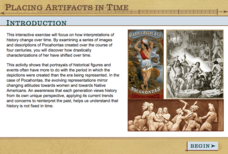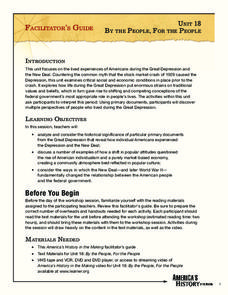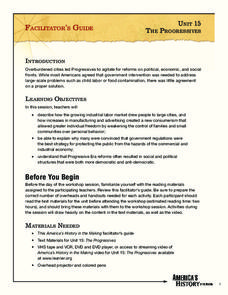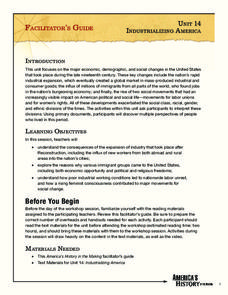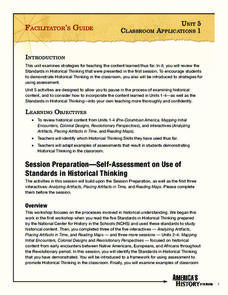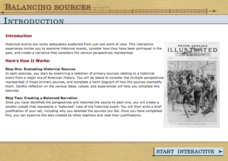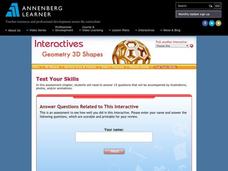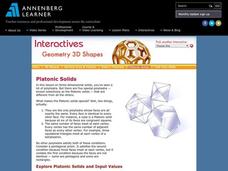Annenberg Foundation
Contested Territories
United States expansion into Western territories impacted much more than just lines on a map. The seventh installment of a 22-part series about America's history puts scholars into the lives of those making the journey westward as well...
Annenberg Foundation
Evaluating Evidence
Was the Civil War fought only due to slavery? Using an interactive web tool, scholars investigate the four main causes of the Civil War. Gathering evidence and data to support their claims, they present a final statistical breakdown...
Annenberg Foundation
Reading Maps
Can you read a map? Scholars use an interactive technology tool to analyze maps of various kinds to gather evidence and data to better understand their meanings and usefulness. Using newly obtained knowledge, they form an interpretation...
Annenberg Foundation
Placing Artifacts in Time
Can history distort the true story behind famous people? Scholars analyze the many faces of the Native American Pocahontas. Incorporating technology and historical thinking skills, they uncover the many different sides to the Pocahontas...
Annenberg Foundation
America's History in the Making: Classroom Applications Four
The final installment of a 22-part American history series examines the many faces that make up the country's story. From Henry Ford to Tulio Serrano, scholars use biographical evidence and Internet research to uncover the people behind...
Annenberg Foundation
Global America
It's not really a small world after all! The 21st lesson of a 22-part series on American history researches the impact of globalization on the United States. Using photographic and written references materials, as well as video sources,...
Annenberg Foundation
Egalitarian America
What does a true American represent? Scholars investigate the equal rights era of the 1960s and 1970s in the 20th installment of a 22-part series on American history. Using photographic, magazine, written, and video evidence, groups...
Annenberg Foundation
Postwar Tension and Triumph
Go get the American Dream lifestyle! The 19th lesson in a 22-part series exploring American history shows learners the post-WWII economic boom. Using primary sources, photographs, and cartoons, groups discuss their findings and present...
Annenberg Foundation
By the People, For the People
A picture speaks a thousand words—no matter how old. The 18th installment of a 22-part series on the making of American history has scholars research the causes of the Great Depression and the factors of the New Deal. Using photographic...
Annenberg Foundation
The Progressives
The Progressive Era brought about a word that often leads to turmoil—change! Learners research the late 1800s in American history to uncover societal issues gripping the nation back in the day. The 15th lesson of a 22-part series...
Annenberg Foundation
Industrializing America
Imagine an eight year old spindle boy working barefoot in a factory in the late 1800s. Scholars research the industrial period in American history in the 14th lesson of a 22-part series that explores the country's background. Groups...
Annenberg Foundation
Taming the American West
Have you ever seen a movie about the romance of the American West with its buffalo, horses, cowboys, and endless frontier? The 13th installment of a 22-part series on American history presents the myths associated with the American West....
Annenberg Foundation
America's History in the Making: Using Digital Technologies
How can digital technology of today link us to the events of the past? Scholars use technology to uncover the vast number of historical resources available in lesson 12 of a 22-part America's History in the Making series. Using databases...
Annenberg Foundation
A Nation Divided
Can a presidential election cause a civil war? Learners research the events surrounding the presidential election of 1860 in a lesson that explores America's history. Using maps, videos, and primary sources, they uncover, brainstorm, and...
Annenberg Foundation
The New Nation
The conclusion of the American Revolution brought about a new conflict—choosing the stye of government for the newly formed United States. Using the views of both Federalists and Anti-Federalists, learners work in pairs and groups to...
Annenberg Foundation
America's History in the Making: Classroom Applications One
Someone finds a time capsule 100 years from now, and it includes your family photo album. What would the photos tell that person about you and your place in history? Scholars investigate how artifacts tell stories. Using photos, maps,...
Annenberg Foundation
Mapping Initial Encounters
Picture someone's excitement of seeing a horse for the first time. How about a cow? The Columbian Exchange changed life for not only Native Americans, but also for Europeans and the entire world. The second lesson of a 22-part series...
Annenberg Foundation
Pre-Columbian America
What was life like in America before Christopher Columbus discovered the New World? Scholars investigate life in the Americas through the eyes of Native Americans in the first lesson of a 22-part series covering America's history. Using...
Annenberg Foundation
Balancing Sources
Pupils turn into investigative reporters throughout history to learn what it takes to balance different primary sources on the same topic. They use what they learn to create a narrative based on their own interpretation of a historic...
Annenberg Foundation
Analyzing Artifacts
If only a mask could talk! Using the interactive tool along with historical thinking skills, pupils uncover the meaning behind the various materials the resource presents. History becomes more relevant as the artifacts tell their stories...
Annenberg Foundation
Geometry 3D Shapes: Test Your Skills
Time to find out what they've learned! The final lesson of a five-part series has learners complete a 39-question multiple choice review. They use what they've learned in the previous lessons to complete questions that include concepts...
Annenberg Foundation
Geometry 3D Shapes: Platonic Solids
From polyhedrons to platonic solids, here is a lesson that will have your classes talking! As an introduction to platonic solids, scholars cut and fold nets to create the three-dimensional solids. They use an interactive component to...
Annenberg Foundation
Geometry 3D Shapes: Euler's Theorem
How do you get a theorem named after you? Euler knows what it takes! The third lesson of five asks pupils to use an interactive activity to compare the faces, vertices, and edges of seven different three-dimensional solids. They use...
Annenberg Foundation
Geometry 3D Shapes: Surface Area and Volume
Whether you wrap it or fill it, you're using geometric concepts. Classmates use an interactive approach to learn how to find volume and surface area of cylinders and prisms in the second lesson in a five-part series. The online lesson...





